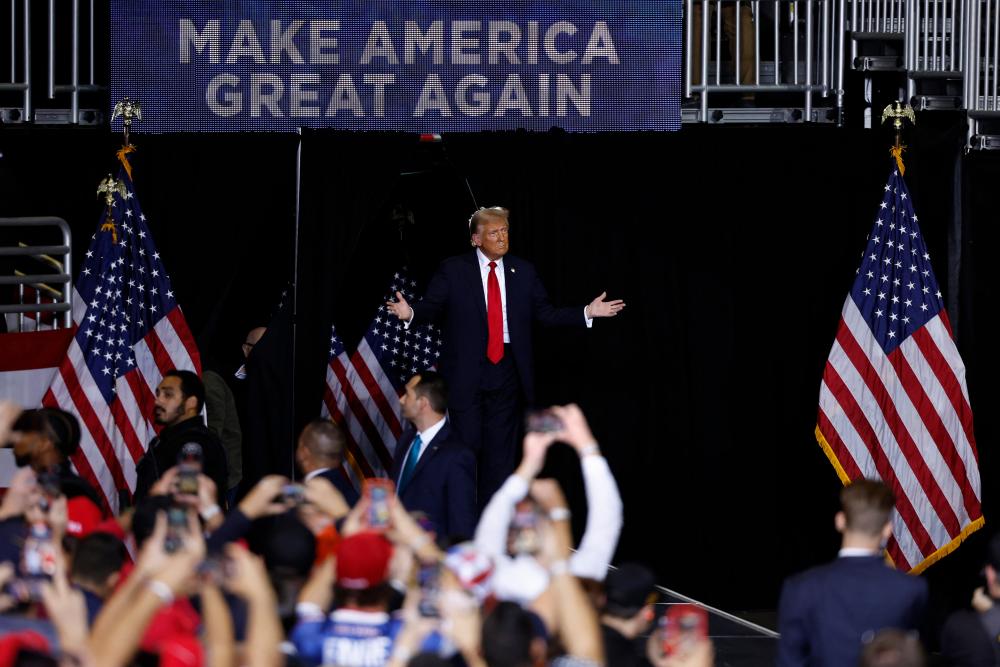At a rally in Wisconsin, Donald Trump made headlines with a controversial speech lasting approximately 90 minutes, where he labelled Vice President Kamala Harris a “low-IQ person” and declared his commitment to saving the economy from “total obliteration.” Trump’s comments reflected the dark tone that often characterizes his campaign rhetoric, particularly on immigration and economic issues. He described a dire economic future should Harris be victorious, foreseeing a return to a “1929 style depression.” In his opening remarks, Trump invoked imagery of a “criminal invasion” and promised to usher in a “golden age,” framing his presidency as essential to national security and economic stability.
Immigration was a significant focus of Trump’s address, where he asserted that he would end what he termed a “migrant invasion” upon taking office. He pledged to implement the “largest deportation program in American history” and painted a grim picture of communities being “conquered” by immigrants, whom he derogatorily referred to as “animals.” Such rhetoric contradicts extensive studies that show immigrants are not disproportionately responsible for crime. Nevertheless, pull quotes from personal testimonies, such as a grieving mother blaming Harris for her daughter’s murder, were strategically employed to bolster the prevailing narrative against immigration during the event.
The rally also featured speakers like Wisconsin Senator Ron Johnson, who echoed Trump’s sentiments, accusing Democrats of equating their political adversaries to “the most evil mass murderers in history.” Johnson’s remarks highlighted a trend within the rally towards victimhood and self-defense against perceived unfair characterizations of the MAGA base. He praised Trump’s efforts to bring notable figures like Robert F. Kennedy Jr. and Tulsi Gabbard into the fold, emphasizing a shift that he claimed had transformed the Republican Party into “the party of working men and women.”
Kennedy, who suspended his presidential campaign, addressed the crowd as well, aligning himself with Trump and encouraging attendees to vote for the former president. He framed his support for Trump as divinely inspired, signaling solidarity among those who have distanced themselves from the Democratic Party narrative. This gathering showcased a coalition of voices reinforcing and amplifying Trump’s campaign messages, thereby cultivating a unifying atmosphere among supporters who resonate with his dire warnings and combative political style.
Additionally, the rally spotlighted electoral strategies with local Republican Congressman Bryan Steil introducing an amendment aimed at prohibiting non-U.S. citizens from voting in Wisconsin elections. This proposal reflects rising anxiety among Trump supporters about illegal voting and non-citizen participation in the electoral process—a narrative that aligns with Trump’s rhetoric of defending American integrity against supposed foreign encroachment. Steil’s call to action received enthusiastic responses from the crowd, further indicating the interconnectedness of Trump’s immigration discourse and local political initiatives.
In the broader context, attendees like Republican activist Jason Tyler articulated their concerns regarding potential foreign influence in elections, claiming they would volunteer as poll observers to identify non-citizens voting illegally. Tyler, whose wife is a naturalized citizen from the Philippines, rejected notions that Trump’s harsh words on immigration are inherently racist. This perspective illustrates the complexities within Trump’s base, where differing personal experiences with immigration coexist alongside a staunch defense of his divisive rhetoric. Overall, the rally wasn’t just about Trump’s candidacy; it was a reflection of the social dynamics, fears, and ideologies that underpin his support, highlighting a platform grounded in fear, exclusion, and a fervent appeal to nationalism.

